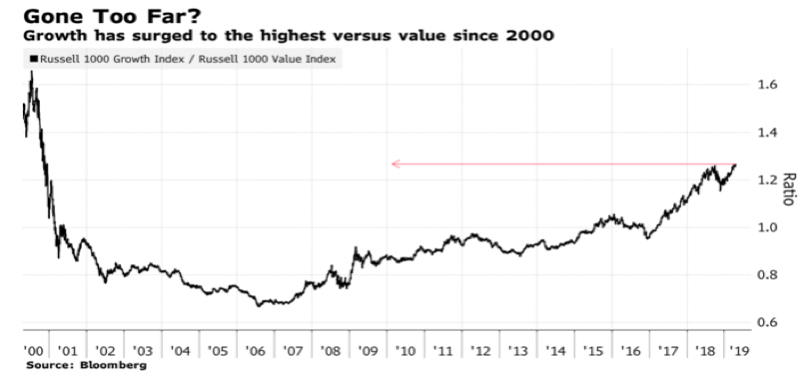The S&P 500 as well as the Nasdaq hit record highs on Tuesday. What’s next?

Can we answer that question without considering the surrounding context and especially the stage of the credit cycle? Cicero used to say that context shapes decorum and the latter, according to Adam Smith, formulates the character of the markets. “But that was the age of competition and not the age of social media and of market concentration,” a critic might say. “Welcome to purgatory,” would be my reply!
In rhetorical appeals, audiences look for a fit between speech and character to determine moral trustworthiness. However, in the age of social media where perceptions become realities, moral trustworthiness is degraded for the sake of appearances. Welcome to purgatory where third-party liabilities are crowned as assets in balance sheets!
If all it took to lift up concerns of trade wars as well as of earnings and sales growth were the pausing of interest rate hikes, then welcome to purgatory! Fundamentals and not ephemeral, manipulated, monetary numbers should be guiding markets-but again, in an age of perception people love to be misled to the ocean of purgatory. Now, we cannot ignore the fact that so far this earnings reporting season the results seem to be better than expected, but this could be because expectations had been lowered too much. Moreover, we cannot deny that cyclical factors point to healthy economic conditions which make up part of the contextual reference we are looking for.
However, investors’ complacency could be part of the picture (quantified by the significant drop in the volatility index) along with the momentum that is being created. We cannot deny the possibility that such momentum may continue (possibly at a slower pace); however, we should also pause and question whether valuation gaps that are being created could favor the losers in the near future.
The underlying market bifurcation (as seen in the following figure which compares the tech sector relative to the rest of market) points to what is usually a sign of a late-cycle playbook.

Even defensive sectors seem overbought, as Alliance Bernstein analysts have pointed out, while M&A deals of over $10 billion are mostly funded by stock shares rather than cash (a possible sign that they consider their own shares overvalued).
At a time when financial conditions are loose, fragilities are building up (in the sovereign, corporate, household, and nonbank financial sectors), leading to elevated risks in the medium term which if properly discounted would question current market valuations (especially when we take into account systemic vulnerabilities such as volatile portfolio flows), downside risks to the real estate sector, Eurozone complexities, and Chinese financial imbalances.
Plato’s equation of virtue and knowledge could be perceived as culminating in Aristotle’s understanding of a magnanimous moderation with the latter exemplified by Cicero’s teaching on natural laws and the tendency of things to return to their natural equilibrium.
Market Records in the Midst of a Maturing Credit Cycle: How Would Cicero React?
Author : John E. Charalambakis
Date : April 25, 2019
The S&P 500 as well as the Nasdaq hit record highs on Tuesday. What’s next?
Can we answer that question without considering the surrounding context and especially the stage of the credit cycle? Cicero used to say that context shapes decorum and the latter, according to Adam Smith, formulates the character of the markets. “But that was the age of competition and not the age of social media and of market concentration,” a critic might say. “Welcome to purgatory,” would be my reply!
In rhetorical appeals, audiences look for a fit between speech and character to determine moral trustworthiness. However, in the age of social media where perceptions become realities, moral trustworthiness is degraded for the sake of appearances. Welcome to purgatory where third-party liabilities are crowned as assets in balance sheets!
If all it took to lift up concerns of trade wars as well as of earnings and sales growth were the pausing of interest rate hikes, then welcome to purgatory! Fundamentals and not ephemeral, manipulated, monetary numbers should be guiding markets-but again, in an age of perception people love to be misled to the ocean of purgatory. Now, we cannot ignore the fact that so far this earnings reporting season the results seem to be better than expected, but this could be because expectations had been lowered too much. Moreover, we cannot deny that cyclical factors point to healthy economic conditions which make up part of the contextual reference we are looking for.
However, investors’ complacency could be part of the picture (quantified by the significant drop in the volatility index) along with the momentum that is being created. We cannot deny the possibility that such momentum may continue (possibly at a slower pace); however, we should also pause and question whether valuation gaps that are being created could favor the losers in the near future.
The underlying market bifurcation (as seen in the following figure which compares the tech sector relative to the rest of market) points to what is usually a sign of a late-cycle playbook.
Even defensive sectors seem overbought, as Alliance Bernstein analysts have pointed out, while M&A deals of over $10 billion are mostly funded by stock shares rather than cash (a possible sign that they consider their own shares overvalued).
At a time when financial conditions are loose, fragilities are building up (in the sovereign, corporate, household, and nonbank financial sectors), leading to elevated risks in the medium term which if properly discounted would question current market valuations (especially when we take into account systemic vulnerabilities such as volatile portfolio flows), downside risks to the real estate sector, Eurozone complexities, and Chinese financial imbalances.
Plato’s equation of virtue and knowledge could be perceived as culminating in Aristotle’s understanding of a magnanimous moderation with the latter exemplified by Cicero’s teaching on natural laws and the tendency of things to return to their natural equilibrium.